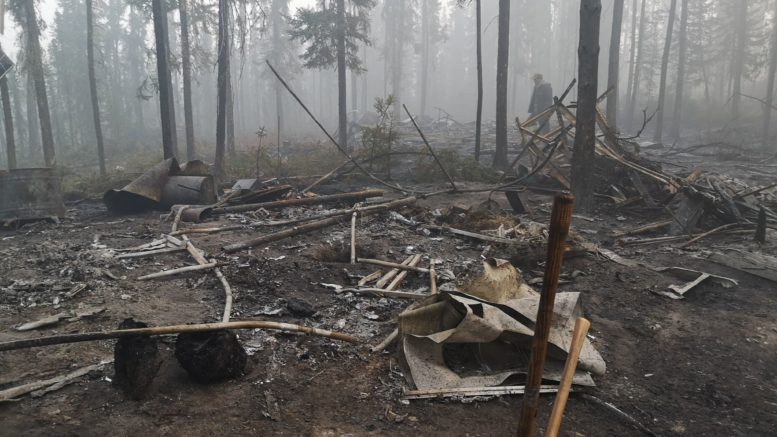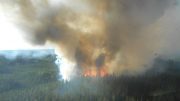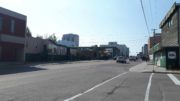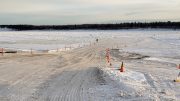William Alger was one of the first people to see the devastation at Scotty Creek firsthand.
“It was just heartbreaking,” says Alger, the project’s lead guardian, who has worked with the team since early 2020. He was on the scene immediately after a naturally-caused wildfire tore through the camp and destroyed five of its nine buildings.
“It’s just a matter of picking up the pieces and figuring out where we go from here,” he says.
As the Scotty Creek research team and Łı́ı́dlı̨ı̨ Kų́ę́ First Nation (LKFN) continue to survey the damage of last week’s fire, team members are still figuring out what the destruction will mean for the future of their research on climate change-driven permafrost thaw.
Bill Quinton, the director of the research centre, wasn’t on the ground as the fire devastated the camp, but his team was providing him with regular updates.
“In the last couple of weeks, it started moving northeast toward the station,” he says. “And before I knew it, it had gone from 32 kilometers away to six kilometers away. And then it was moving at about a rate of a kilometer a day in the direction of the station. And before we knew it, it was on the doorstep of the station.”
With the fire still recent, the team is still tallying their losses. “It looks to be quite substantial,” says Quinton. “Most of the station infrastructure was lost. And because of the heat and the great extent of the fire, most of the scientific infrastructure over the landscape has also been lost.”
LKFN, which manages the station, is also reeling from the loss: In a statement on Wednesday, LKFN said the fire “is going have a series of impacts that will have an ongoing affect on our already delicate local economy. Our hotels, bed and breakfasts, charter airlines will take the biggest hit. Important climate change research, youth education, and the economic activities that is part of keeping it going will now be temporarily halted.”
Despite the damage to the camp and its work, last week’s fire may present an opportunity: “I think without a doubt, this does provide some opportunity to understand fire behavior, fire impacts,” says Quinton. “Here we have close to 25 years of extensive landscape and hydrological monitoring in advance of any sort of attempt to examine the impacts of the fire. So to that extent, researchers have been contacting me and saying, ‘Wow, the scientific opportunities are immense here.’”
Although there’s no timeline yet for the rebuilding of Scotty Creek, Quinton says the LKFN is eager for the station to again be a place where researchers and students of all backgrounds can share and grow their knowledge.
“This is what the vision is, and the vision is still there. It’s just that we’ve lost a big chunk of the infrastructure. So we’re sticking to that vision, and we are going to come back and rebuild.”
LKFN Chief Kele Antoine did not respond to multiple requests for comment.









